

Civil Engineering, School of. Civil Engineering, School of Key measures: Positive Outcomes: 98.8%, Graduate prospects: 90.1%, Graduate employment: 91.1% Graduate destinations: Work Full-time: 91%, Work Part-time: 6%, Work & Study: 1%, Further study: 1%, Unemployed: 1% Top industry sectors: Engineering; Buying, Selling & Retail; Administration; Event Management, Leisure, Hospitality & Tourism; General Management & Business Operations Salary levels: Under £10,000: 7%, £10,000-£19,999: 9%, £20,000-£29,999: 82%, £30,000-£39,999: 2%, Over £40,000: 0% The Leeds Network We have an extensive network of alumni with a wide range of experiences, doing all kinds of jobs.
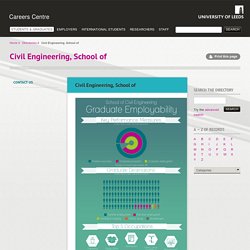
Websites and downloadable resources Civil engineering careers resources Careers in renewable energy Options with civil engineering Institute of Civil Engineers Institution of Structural Engineers Careers in Construction. Downloads. Downloads. What can I do with my degree in civil engineering? A civil engineering degree prepares you for work in the construction industry as well as in the broader business, management and financial sectors Job options Jobs directly related to your degree include: Jobs where your degree would be useful include: Remember that many employers accept applications from graduates with any degree subject, so don't restrict your thinking to the jobs listed here.
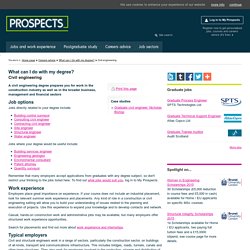
To find out what jobs would suit you, log in to My Prospects. Work experience Employers place great importance on experience. What can I do with a structural engineering degree? Skills You might know the difference between structural buckling and structural vibration, but here are some of the other skills that your structural engineering degree might have helped you to develop: Advanced I.T.
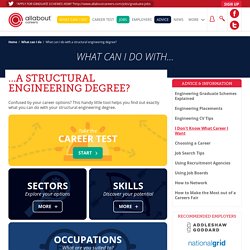
Skills Microsoft office? Child’s play! Analytical Skills You’re better than Shearer and Hansen put together. Attention to Detail You can spot a needle in a haystack. Communication (Oral) All mouth, no trousers? Computer-Aided Design Forget pen and paper, you’ve got highly desirable computer-aided design skills. Data Handling You can compile, organise and analyse data. Decision Making If a decision needs to be made, you have the confidence to make it. Independence You don’t need somebody holding your hand the entire time. Leadership You’re a shepherd, not a sheep. Logic You ain’t no fool! Numeracy Forget 2 + 2 = 4, you’ve got the numeracy skills to give Carol Vorderman a run for her money. Problem Solving You’re a bit like Jimmy McNulty in The Wire. Research Teamwork. 61104179 8334 4652 891a 8641fd772d64. What can I do with a building and contruction management degree? Employers of building and construction management graduates are interested in your technical knowledge and professional skills.
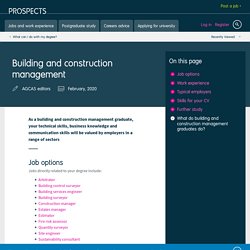
Find out what you can do with them… Job options Jobs directly related to your degree include: The technical, management and professional skills developed during your degree are also welcomed by employers in other sectors, such as finance, marketing, logistics, personnel and general management. Jobs where your degree would be useful include: Remember that many employers accept applications from graduates with any degree subject, so don't restrict your thinking to the jobs listed here. Work experience Many building and construction management courses offer chances to complete placements, or you could try to secure summer work with relevant companies. Make the most of any work placements you do as many companies use them as a way to recruit future employees. Temporary work with a relevant company can also be useful for making contacts and networking.
Typical employers. Www.istructe.org - Careers and development - The Institution of Structural Engineers. The Institution is dedicated to providing first class support for its members - helping them develop their full potential throughout their engineering career.
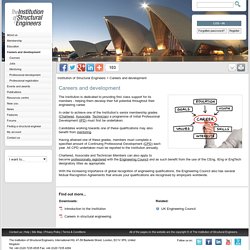
In order to achieve one of the Institution's senior membership grades (Chartered, Associate, Technician) a programme of Initial Professional Development (IPD) must first be undertaken. Candidates working towards one of these qualifications may also benefit from mentoring. Having attained one of these grades, members must complete a specified amount of Continuing Professional Development (CPD) each year. All CPD undertaken must be reported to the Institution annually. Chartered, Associate and Technician Members can also apply to become professionally registered with the Engineering Council and as such benefit from the use of the CEng, IEng or EngTech designatory titles as appropriate. Careers. Transport planning is about preparing, assessing and implementing policies, plans and projects to improve and manage our transport systems.
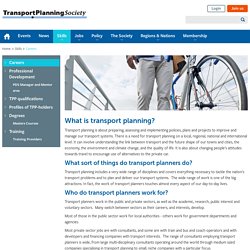
There is a need for transport planning on a local, regional, national and international level. It can involve understanding the link between transport and the future shape of our towns and cities, the economy, the environment and climate change, and the quality of life. It is also about changing people's attitudes towards travel to encourage use of alternatives to the private car. What sort of things do transport planners do? Transport planning includes a very wide range of disciplines and covers everything necessary to tackle the nation's transport problems and to plan and deliver our transport systems.
Who do transport planners work for? Transport planners work in the public and private sectors, as well as the academic, research, public interest and voluntary sectors. How do I become a transport planner? P1 TPS standingoutfromthecrowd. Membership - Institution of Civil Engineers (ICE) Property and construction.